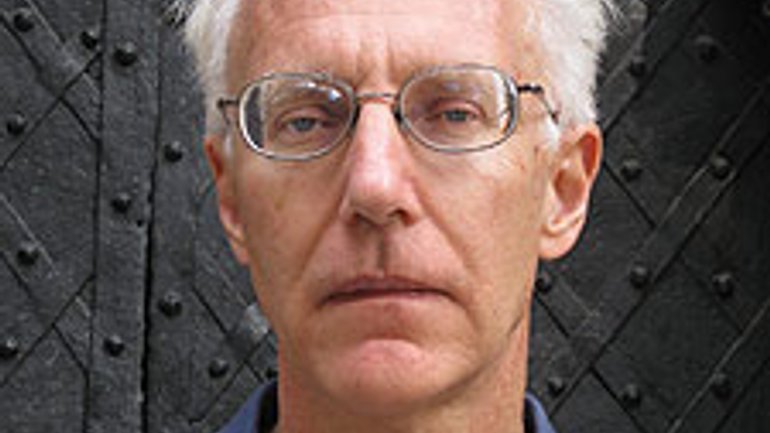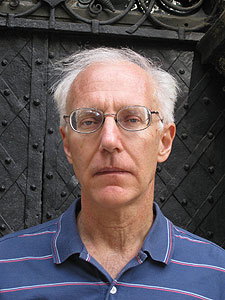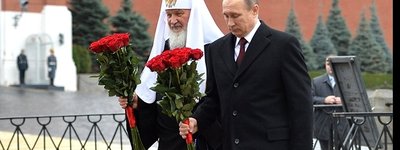Hilarious — even Chaplinesque

 In Metropolitan Hilarion’s view, the crisis in Ukraine, which in fact consists of a Russian invasion, is being exacerbated by the Greek-Catholic Church. Evidently, standing by the people, seeking to mediate, offering pastoral aid, and comforting the wounded and dying serve only to “make the crisis worse.”
In Metropolitan Hilarion’s view, the crisis in Ukraine, which in fact consists of a Russian invasion, is being exacerbated by the Greek-Catholic Church. Evidently, standing by the people, seeking to mediate, offering pastoral aid, and comforting the wounded and dying serve only to “make the crisis worse.”
Last June, Metropolitan Hilarion of Volokolamsk, chairman of the Russian Orthodox Church’s Department of External Church Relations, addressed the Fourth European Orthodox-Catholic Forum in Miensk, Belarus. He devoted half of his greetings to the issue of Ukraine. (Quoted from rospat.ru by Robert Moynihan, Letter #22, 2014) Several of his statements about Ukraine merit commentary.
Metropolitan Hilarion asserted that in Ukraine, “The people remain deeply divided not only according to their political choices but also on religious lines.” Formally speaking, this is true. There are Ukrainian Orthodox and Ukrainian Greek-Catholics, for example. But what does “deeply” divided mean? And do these religious divisions coincide with political divisions? In fact, they do not: many Ukrainian Orthodox share the political positions of Greek-Catholics. And neither the political nor the religious differences are so deep as to actually divide the nation. On the contrary, foreign invasion has brought the Ukrainian people closer together.
“Sadly,” lamented Hilarion, “the Greek Catholics have played a very destructive role in allowing this situation to develop. The words of their leading archbishop, hierarchs and clergy and an extremely politicized position have brought about the polarization of society and a worsening of the conflict which has already led to numerous victims.”
First, one must ask how a minority of five out of forty-five million, concentrated in the west of the country, could be faulted for “allowing” the “situation” in the east to develop. And what situation, exactly, is Hilarion referring to? Ukraine is not in a state of civil war. It is being invaded by Russia. Hilarion himself bears more responsibility for “allowing this situation to develop” than the Greek Catholics. And what are these destructive “words” and “extremely politicized position”? The Church supported the people’s just demands that the government keep its promise of an Association Agreement with the European Union, that it end corruption, and that it cease to kidnap, torture, and kill journalists and political activists. That is what a truly Christian Church of the people does. Did this “worsen the conflict”? What worsened the conflict was the brutality of the Yanukovych government’s riot police and snipers, and the armed aggression of Hilarion’s government.
The metropolitan continued: “…the Uniates have ostentatiously associated themselves with only one of the belligerent forces. The aggressive words of the Uniates, actions directed at undermining the canonical Orthodox Church, active contacts with schismatics and the striving to divide a single multinational Russian Orthodox Church have caused great damage not only to the Ukraine and her citizens, but also to the Orthodox-Catholic dialogue.”
In fact, there is only one belligerent force: the Russian special forces, volunteers, mercenaries, and their collaborators. But if Hilarion is referring to the period before the invasion, then there were indeed two forces: the Yanukovych government, and the peaceful demonstrators on the Maidan. And yes, the Greek-Catholic Church sided with one of these forces: the people. Hilarion’s allegation that the Greek-Catholics are “striving to divide a single multinational Russian Orthodox Church” is peculiar. First of all, how can a Church be both Russian and multinational? Second, does he mean that the Ukrainian Orthodox Church under the Moscow Patriarchate is a sham, since there is only a single Russian Church?
The metropolitan concludes that “Today once again it has been all the more obvious what the Orthodox knew – that the Unia was and, unfortunately, remains a special project of the Catholic Church aimed at undermining canonical Orthodoxy.” In one sentence, he reverses decades of ecumenical rapprochement, whereby the Orthodox Church gradually came to admit that the Eastern Churches in union with Rome had a right to exist and to participate in the dialogue. Now, Hilarion has reverted to the old position that the Union is a Catholic plot to divide the Orthodox Church. We are back to the seventeenth century. But today, this conspiracy theory constitutes a perfect analogue to Russia’s theory that the Maidan itself was a conspiracy hatched by the U.S. government to divide Russia. Perhaps he believes, along with Aleksandr Dugin, that the very notion of a Ukrainian people is part of a Western conspiracy to destroy his country.
Next, Hilarion calls for suppression of the Greek-Catholic Church’s activities: “Allow me to use this platform to appeal to all our partners in the Orthodox-Catholic dialogue to do all that is possible to cool down the ‘hotheads’ among the Uniates, to halt the actions of the Greek Catholics in making the crisis in the Ukraine worse.” In his view, the “crisis” in Ukraine, which in fact consists of a Russian invasion, is being exacerbated by the Greek-Catholic Church. Evidently, standing by the people, seeking to mediate, offering pastoral aid, and comforting the wounded and dying serve only to “make the crisis worse.”
And now the metropolitan reveals the real aim of his discourse: “Today,” he asserts, “one part of the Catholic Church is employing all her strength, talents and resources in strengthening Orthodox-Catholic interaction, while another (even though it enjoys autonomous status) is doing everything possible, as in former unfortunate times, to drive the wedge of distrust and enmity between Orthodox and Catholics.” The arrogance of an Orthodox prelate judging which part of the Catholic Church is advancing ecumenical dialogue and which part is hindering it is certainly striking. But it is clear where and by whom the wedge is being driven: not by the Greek-Catholics between Catholics and Orthodox, but by Hilarion himself between Roman Catholics and Greek-Catholics, in order to isolate and neutralize the latter.
It is a clever maneuver, which parallels the Russian diplomatic strategy of blaming the victim of its aggression for the “crisis,” in order to isolate that victim from its natural allies. It displays the same kind of hypocrisy as Fr. Vsevolod Chaplin’s calling on the Ukrainian forces in the Crimea not to resist the invading Russians, lest there be bloodshed. The Moscow Patriarchate is certainly doing its part in the noble Russian war effort, reliving World War II by fighting the “Nazis” in Kyiv. Were it not so tragic, it would be hilarious – even Chaplinesque.










